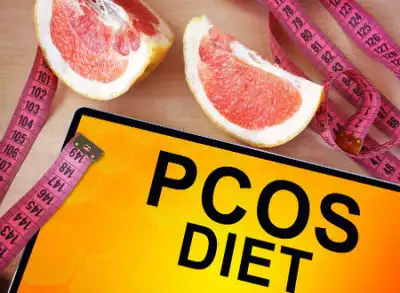
The signs of polycystic ovarian syndrome (PCOS) can be significantly reduced by losing weight. Losing weight helps enhance a woman with PCOS’s hormonal balance, sensitivity to insulin, and general well-being, but it cannot totally reverse the disorder. In order to better grasp this link, we will explore the numerous ways losing weight might affect PCOS symptoms favorably in this blog and get the perfect answer to the question, “Can PCOS be reversed with weight loss?”
Insulin resistance is one of the main reasons that weight loss is associated with PCOS. A hormone that controls blood sugar, insulin, is found in many individuals with PCOS in elevated amounts. Insulin levels rise as a result of insulin resistance, which happens when the body loses its ability to respond to the impacts of insulin. Weight gain, an increase in androgen hormone production, and irregular menstruation periods can all be caused by this. However, it has been demonstrated that losing weight enhances insulin sensitivity and lowers insulin levels, reducing the symptoms of insulin resistance.
For PCOS-afflicted women, losing weight might aid in hormonal rebalancing. The reproductive hormones estrogen, progesterone, and androgens (such as testosterone) are all out of balance in PCOS. Weight gain can lead to further hormonal abnormalities and exacerbate PCOS symptoms. Hormonal imbalances, on the other hand, can be reduced when weight is removed. For instance, lowering weight can lower testosterone production, which will lessen hirsutism (hair growth disorders), acne, and hair loss. Additionally, losing weight can enhance fertility, develop ovulation frequency, and control menstrual cycles.
Also Read: Can You Reverse PCOS With A Diet?
Another area that losing weight in PCOS-afflicted women might favorably affect is inflammation. It is common to find chronic low-grade inflammation in obese and PCOS patients. This inflammation may make insulin resistance worse, mess with hormone balance, and cause metabolic issues. It has been demonstrated that losing weight lowers inflammatory markers in the body, lowering the total inflammatory load and easing PCOS symptoms. It is essential to adopt a comprehensive strategy that emphasizes long-term lifestyle improvements when it comes to fat reduction solutions for PCOS control. Extreme or crash diets can be harmful to general health and may cause weight gain. Instead, it is advised to lose weight gradually by eating an appropriate diet and exercising frequently. Whole foods that are nutrient-dense, low in refined carbs, and sugar-free should be part of an appropriate diet for PCOS weight loss. Stress the importance of eating lean proteins, which can promote satiety and enhance muscular growth. For their fiber content and important vitamins and minerals, select whole fruits, grains, and vegetables. Moderate consumption of healthy fats from foods like nuts, seeds, avocados, and olive oil is advised.
A Brief Account of Reverse PCOS and Weight loss!
Table of Contents
If you think that by losing weight you are going to cure PCOS, then you are wrong because there is no cure for PCOS. But a PCOS patient can maintain the balance of their hormone levels while losing weight under the guidance of a registered dietitian.
A healthy diet and regular exercise are adjustments to your way of life that help your body use insulin more effectively and better balance your hormone levels. Due to their ability to manage your cycle of menstruation and lower testosterone levels, birth control tablets may additionally be a viable treatment choice if you have no immediate plans to become pregnant.
By minimising the length of time the uterus is subjected to estrogen that is not being countered, birth control tablets also appear to reduce the chance of endometrial cancer. You should talk to your doctor to see whether this choice is good for you because birth control tablets are linked to an elevated probability of blood clots, particularly in obese individuals and women who are older than 40.
Ovulation stimulation can be helped with fertility medical treatment if one wants to get pregnant. And this would be enough to encourage the process for a woman with a scarcity of ovulation. This is why a PCOS patient struggles with fertility issues.
The likelihood of an effective ovulation can also be improved by surgery called ovarian drilling. Although the procedure has the potential to momentarily reduce your testosterone levels, there is a chance that scar tissue will form.
Must Read: PCOS/PCOD Health Coach In Patna!
Obesity and PCOS
It is true that obesity can turn PCOS into a nightmare, but it is also true that PCOS does not discriminate between the shape and size of a person.
Weight gain and PCOS are related because of the body’s improper usage of insulin, which can cause weight gain. Because of this, establishing good diet and exercise routines is advised as a component of the majority of treatment plans for women.
How is PCOS impacted by obesity?
Resistance to insulin is one of the causes of excessive androgen production. A surplus of insulin produced by the body can result in insulin resistance, which impairs the proper absorption of the hormone. The inability to correctly utilize insulin causes the body to produce more glucose, which may cause the ovaries to produce more androgen. Weight gain and problems reducing weight can both be caused by insulin resistance.
Gaining weight raises the risk of heart disease, type 2 diabetes, high blood pressure, and sleep apnea. Your health hazards increase as your weight increases. You can lessen the signs and dangers of PCOS by losing weight—even only 5% of your body weight. Obesity raises your likelihood of having PCOS, and PCOS increases your risk of being overweight.
Also Read: Can You Reverse PCOS Facial Hair?
Weight Loss with PCOS
Losing weight can assist with symptoms and period control for people with polycystic ovarian syndrome, also known as PCOS. However, PCOS can make it challenging to lose weight. One cause of fat accumulation is an excess of insulin produced by your body as a result of PCOS.
The hormone insulin is responsible for moving glucose, the body’s primary fuel source, from circulation into the cells, where it may be utilized as energy. The insulin your body produces and uses are both impacted by PCOS. Your pancreas produces more insulin as a result of your cells developing resistance to insulin signals. This is referred to as poor glucose tolerance or insulin resistance. A high insulin level can lead to weight gain or fat accumulation, especially around the abdomen.
Excess insulin may be the cause if you consistently gain weight or are unable to shed it without making major dietary or activity adjustments. Most PCOS treatments try to lower insulin levels and include dietary changes, exercise, prescription drugs, and/or nutritional supplements.
Insulin stimulates hunger as part of its role in increasing fat accumulation. Women who’re insulin-dependent have reported having strong, intense, and often urgent cravings. High insulin levels may be the cause of some PCOS patients’ increased appetites. Cravings may undermine even the healthiest eating practices if they aren’t controlled, increasing calorie intake and weight gain. To decrease cravings, eat often, include adequate protein throughout meals, and stay away from sugary foods.
Hormones that regulate appetite are impaired
A PCOS-related hormonal imbalance that affects hunger and fullness perception is another potential cause that may make weight reduction and weight management challenging for those with PCOS. It has been demonstrated that women with PCOS have abnormally low levels of cholecystokinin and the hormones ghrelin and leptin, which control hunger. PCOS patients may experience increased appetite due to these hormones’ dysfunctional levels. That makes it challenging to maintain a healthy weight and pushes you to eat more.
Your Diet Is Raising Blood Sugar Levels
It can be the kinds of things you are consuming if you have been following your diet but still haven’t lost any weight. A 2010 study examined two teams of PCOS-afflicted women. Both ingested the same number of calories and the same proportions of macronutrients (50 percent carbs, 23 percent protein, 27 percent fat, and 34 grammes of fiber).
The glycemic index of the meals they consumed was where they diverged. Each food’s glycemic index shows how much it raises blood sugar. The insulin levels of the PCOS women who adhered to a low-GI diet improved three times more than those of the non-adherents, and their menstrual cycles were more regular.
These results imply that individuals with high insulin levels might be able to shed more weight by consuming a low-GI meal.
Can PCOS be reversed with weight loss? Yes, with changes to your lifestyle!
A hormonal condition known as PCOS affects many women all over the world. The ability to regulate one’s weight is one of the main difficulties PCOS patients have. In addition to raising the risk of developing related diseases, including insulin resistance and diabetes, excessive weight gain can worsen PCOS symptoms. Luckily, adopting a perfectly fit lifestyle that includes food adjustments, consistent exercise, and stress reduction will greatly aid in weight loss and PCOS control. In this post, we’ll talk about practical lifestyle changes that PCOS-affected people may do to help them lose weight.
Suggested Read: How Do I Reverse Insulin Resistance In PCOS?
A Regular Exercise Programme to Reverser PCOS
Consistent physical activity is essential for shedding pounds and enhancing general health. Exercise improves hormone regulation, calorie burning, stress reduction, and insulin sensitivity. Here are some suggestions for exercises:
- Include aerobic exercises in your regimen, such as brisk walking, running, cycling, swimming, or dancing. Aim for 150 minutes or more per week of aerobic activity at a moderate level.
- To build muscular mass, use resistance workouts or weighted bands. This may support fat reduction by boosting metabolism.
- HIIT, or high-intensity interval exercise, can help you lose weight and strengthen your heart. Alternate brief rest intervals with vigorous activity spurts.
- Look for strategies to improve daily physical activity generally. Use the staircase instead of the lift, travel small distances on foot or by bicycle, and move around more during the day.
Suggested Read: Can PCOS Be Reversed? Detailed Answer
Sleep and Stress Reduction
- In PCOS-affected women, stress and poor sleep can lead to fat gain and hormonal imbalances. Making sleep a priority and incorporating stress management strategies might be helpful:
- Reduce stress levels by using relaxation techniques such as meditation, yoga, deep breathing, or indulging in a hobby. If stress becomes overwhelming, think about counseling or therapy.
- Spend 7-9 hours each night getting a good night’s sleep. Create a sleep-friendly atmosphere, establish a consistent sleep schedule, and restrict screen time prior to slumber.
Find your answer to the question, “Can PCOS be reversed with weight loss with the help of a registered dietitian.
A healthy lifestyle is one of the best ways to regulate your weight when you have PCOS. Women with PCOS may enhance their general well-being, control their body weight, and better manage the symptoms linked to this hormonal illness by making dietary modifications, getting regular exercise, controlling stress, and putting sleep first. To tailor these lifestyle changes to specific requirements, speaking with a healthcare expert is advised.
Dt. Rukhsana Azhar from DIET4U WELLNESS can help you!
Dt. Rukhsana’s Azhar PCOS treatment weight loss approach has helped hundreds of patients accomplish their goals for health and well-being and is backed by the latest research. To create the ideal strategy for your health journey, she takes into account diagnosis, food, exercise, and lifestyle.

Hello My Name is Dt. Ruksana Azhar and I am a certified dietician and providing online & offline services for Weight Management, PCOS/PCOD Management, Diabetes Management , etc. I have 12+ years of experience in the Apollo Hospital Delhi , Max Super Specialty Hospital Delhi, Lilavati Hospital Mumbai and VLCC healthcare Mumbai. I loves to write healthcare and lifestyle related blog. My favorite part of being a doctor is the opportunity to directly improve the health and wellbeing of my patients and to develop professional and personal relationships with them.



